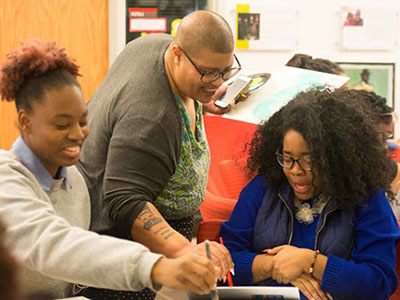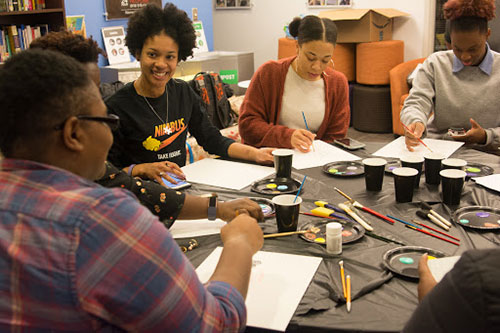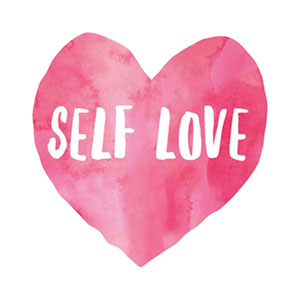
This article is the first in a series on healthy relationships by OIED communications intern Leah Block. who is also a former co-president of The Movement, a student organization that focuses on interpersonal violence peer education and advocacy efforts. Coming up, articles will cover healthy intimate partner relations and healthy inter-community relations.
Let’s think for a moment about the most important relationship we will have in life. I’m talking about that relationship with the very person you will spend your entire life with. The relationship with that person whose life experience you have direct contact with. The person who you are always around. Nope, it’s not your best friend, and no, it’s not even your partner or spouse. It’s you.
The truth is, the most important relationship in life is the one you have with yourself. According to Psychology Today, the relationship to oneself is the basis of healthy development, including our connectedness to the world around us. Self-love is the basis of a healthy-self relationship. So what is being done to nourish self-love practices at NC State? Well, there’s a lot.
We’ve curated a list with some basic tips and opportunities that can bolster self-love practices, though the list is certainly not exhaustive.
Tip #1: Create a Positive Self-Love Mindset
Building a healthy self-relationship is a practice. As in any other practice, we often need support from people who care. NC State’s Campus Community Centers offer spaces where students can build healthy self-love practices through a number of opportunities. Whether it be through the many different events and workshops happening, such as the Mixtape Series and Drop-In Counseling Hours, there are many opportunities for students to commune with others about developing a healthy self-relationship.
Drop-In Counseling Hours
 During drop-in counseling hours at each of the campus community centers, students can feel safe to share the challenges, whether internal or external, that they are facing. Drop-in counseling hours happen every week at the centers and are completely confidential. If you ever need to talk about feeling down, come by during any of the following times at any of the following locations:
During drop-in counseling hours at each of the campus community centers, students can feel safe to share the challenges, whether internal or external, that they are facing. Drop-in counseling hours happen every week at the centers and are completely confidential. If you ever need to talk about feeling down, come by during any of the following times at any of the following locations:
- Mondays, 2:00 – 4:00 p.m., Women’s Center,
Talley Student Union, Suite 5210 - Tuesdays, 10:00 a.m. – 12:00 p.m., African American Cultural Center, Witherspoon Student Center, Suite 355
- Tuesdays, 2:00 – 4:00 p.m., GLBT Center,
Talley Student Union, Suite 5230 - Thursdays, 3:00 – 5:00 p.m., Multicultural Student Affairs,
Talley Student Union, Suite 4261
It can be difficult at first to challenge and confront our own negative thinking, but once it becomes habit, our inner voice will sustainably become a more positive, assuring one. Personally, I have used drop-in counseling hours at the GLBT center, and it always felt very laid-back, and of course, judgment-free.
Tip #2: Be Curious. Explore Your Identity through Engaging Events
If you listen closely to yourself and engage in interesting activities, you can learn much about your identity. Personal identities include one’s self-image, personal values, goals and dreams. Building a connection to your personal identity is an important component of a healthy self-love practice.
Unique Workshops
There is much being done to foster the exploration of personal identities at NC State. This past December, I participated in an event at the Women’s Center that challenged dominant narratives about bodies and identity. The event, which was hosted and guided by resident artist Gemynii, was called “The Politicization and Sexualization of Black Bodies.”

Gemynii’s focus as an artist is around self-love. Gemynii’s artist statement on their website exemplifies their passion:
“The images I create are about empowering, celebrating, and uplifting people of color through visual representation. My work is often a response to past and present social justice issues, body positive representation and current culture. I also aim to show the beauty of women with bellies, people with scars, darker skin… and to the revolutionary act of self love,” — Gemynii

At the event, 20-25 participants painted personal narratives about their identities. Many participants painted parts of themselves that they seek to give more love to. Student participant Khadija Parker said this about the event:
“I enjoyed how there was no right or wrong thing while painting. I appreciated the experience of being able to sit in community with other women of color and paint freely. This event made my feelings feel validated… and that my narrative matters, regardless of who would sit and listen. I view myself as more capable of being creative since this event.”
The resulting artwork will comprise the exhibition, “The Politization and Sexualization of Black Bodies.” opening on February 11, 2019 from 7:30 – 10:00 p.m. in the African American Cultural Center Art Gallery in Witherspoon Student Center.
There are plenty of opportunities like this one to explore ourselves and embrace our developing identities as young adults; this was just one of them. Activities and events offered by the Office for Institutional Equity and Diversity can help students to listen to and create their own personal narratives. Listen to yourself and those subtle tugs toward exploration, and you will find a lot waiting there for you.
Tip #3: Nourish your physical needs.
As long as we are alive, we need basic nourishment to perform daily tasks and functions. It may help to think of your body as a vehicle — strong and powerful— and you need proper fuel to run and make the day happen. To develop a healthy self-relationship, we must pay careful attention to our most basic physical needs.
Eat, Sleep and Get Active
Meeting basic physical needs can help us achieve our personal goals in all areas of life. Eating, sleeping and getting active are all great ways to keep your body — your “vehicle” — strong, healthy and fuel-efficient.  According to research at National Institutes of Health, 7-8 hours of sleep every night can improve cognitive function, increase memory retention and reduce stress-related hunger spikes
According to research at National Institutes of Health, 7-8 hours of sleep every night can improve cognitive function, increase memory retention and reduce stress-related hunger spikes
When it comes to eating, eat to nourish your body’s needs. According to Psychology Today, what we consume has a direct affect on our mood, our physical capacities and our ability to focus. Dietitians recommend eating a variety of foods in controlled portions, such as colorful fruits and veggies, healthy whole grains, nuts, seeds, legumes, lean meats and low-fat dairy products.
 In 2019, let’s find out how self-love practice can change our personal and interpersonal lives. It is my hope that this article has provided clear avenues for readers to begin or deepen their self-love journey here at NC State. Self-love is a practice and a learning process, so remember to be gentle with yourself along the way.
In 2019, let’s find out how self-love practice can change our personal and interpersonal lives. It is my hope that this article has provided clear avenues for readers to begin or deepen their self-love journey here at NC State. Self-love is a practice and a learning process, so remember to be gentle with yourself along the way.
Subscribe to the Diversity Digest to read the next articles in the series.
Leah Block is a senior majoring in interpersonal, organizational and rhetorical communication, with a minor in sociology, and a communications intern in the Office for Institutional Equity and Diversity.